Three Ethical Lenses on Ransomware: A Deep Dive Analysis
VerifiedAdded on 2023/06/10
|5
|2122
|253
Essay
AI Summary
This essay provides a comprehensive analysis of the ethical issues surrounding ransomware attacks from three distinct perspectives: professional ethics, philosophical ethics, and sociological/descriptive ethics. The professional ethics perspective examines the responsibilities of developers and organizations in preventing and responding to ransomware, highlighting the unethical nature of creating and deploying malicious software. The philosophical ethics perspective explores the moral implications of ransomware attacks, considering the perspectives of both attackers and victims, and questioning the justification of causing harm for personal gain. Finally, the sociological/descriptive ethics perspective delves into the various ethical frameworks, such as meta-ethics, normative ethics, and descriptive ethics, to understand the attitudes and behaviors of individuals and authorities in the face of ransomware threats. The essay references various academic sources to support its arguments and provide a well-rounded discussion of the ethical complexities of ransomware attacks.
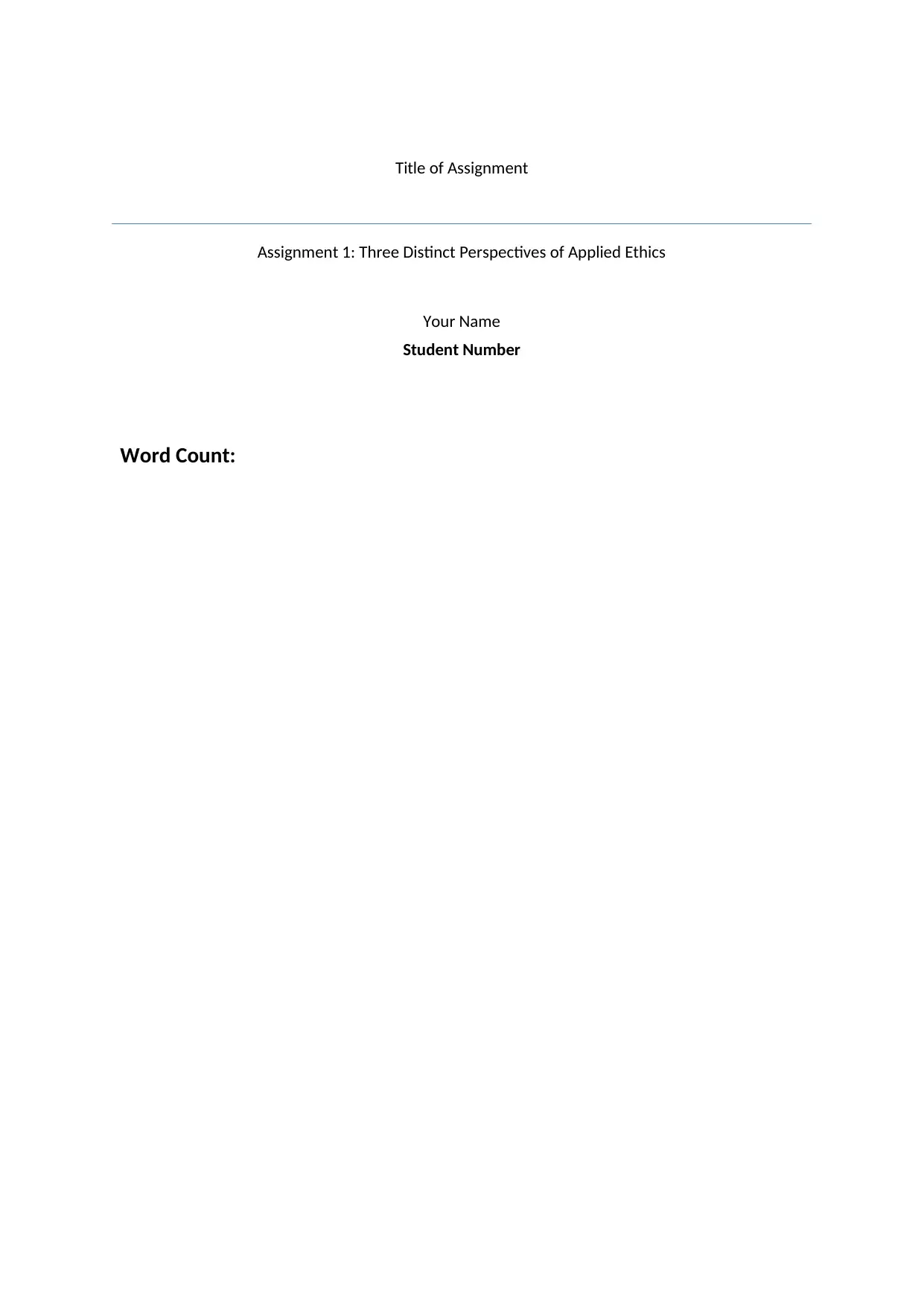
Title of Assignment
Assignment 1: Three Distinct Perspectives of Applied Ethics
Your Name
Student Number
Word Count:
Assignment 1: Three Distinct Perspectives of Applied Ethics
Your Name
Student Number
Word Count:
Paraphrase This Document
Need a fresh take? Get an instant paraphrase of this document with our AI Paraphraser
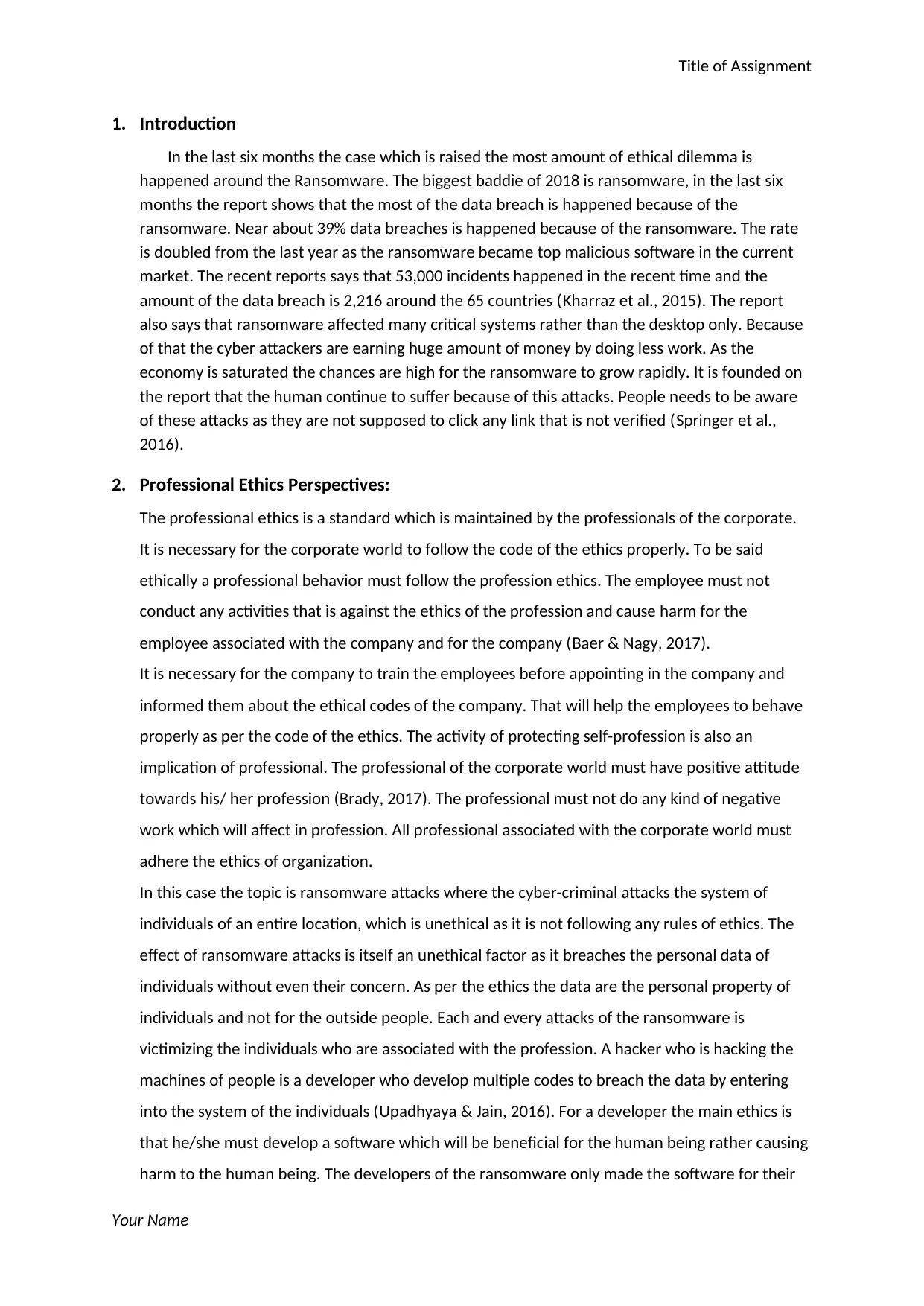
Title of Assignment
1. Introduction
In the last six months the case which is raised the most amount of ethical dilemma is
happened around the Ransomware. The biggest baddie of 2018 is ransomware, in the last six
months the report shows that the most of the data breach is happened because of the
ransomware. Near about 39% data breaches is happened because of the ransomware. The rate
is doubled from the last year as the ransomware became top malicious software in the current
market. The recent reports says that 53,000 incidents happened in the recent time and the
amount of the data breach is 2,216 around the 65 countries (Kharraz et al., 2015). The report
also says that ransomware affected many critical systems rather than the desktop only. Because
of that the cyber attackers are earning huge amount of money by doing less work. As the
economy is saturated the chances are high for the ransomware to grow rapidly. It is founded on
the report that the human continue to suffer because of this attacks. People needs to be aware
of these attacks as they are not supposed to click any link that is not verified (Springer et al.,
2016).
2. Professional Ethics Perspectives:
The professional ethics is a standard which is maintained by the professionals of the corporate.
It is necessary for the corporate world to follow the code of the ethics properly. To be said
ethically a professional behavior must follow the profession ethics. The employee must not
conduct any activities that is against the ethics of the profession and cause harm for the
employee associated with the company and for the company (Baer & Nagy, 2017).
It is necessary for the company to train the employees before appointing in the company and
informed them about the ethical codes of the company. That will help the employees to behave
properly as per the code of the ethics. The activity of protecting self-profession is also an
implication of professional. The professional of the corporate world must have positive attitude
towards his/ her profession (Brady, 2017). The professional must not do any kind of negative
work which will affect in profession. All professional associated with the corporate world must
adhere the ethics of organization.
In this case the topic is ransomware attacks where the cyber-criminal attacks the system of
individuals of an entire location, which is unethical as it is not following any rules of ethics. The
effect of ransomware attacks is itself an unethical factor as it breaches the personal data of
individuals without even their concern. As per the ethics the data are the personal property of
individuals and not for the outside people. Each and every attacks of the ransomware is
victimizing the individuals who are associated with the profession. A hacker who is hacking the
machines of people is a developer who develop multiple codes to breach the data by entering
into the system of the individuals (Upadhyaya & Jain, 2016). For a developer the main ethics is
that he/she must develop a software which will be beneficial for the human being rather causing
harm to the human being. The developers of the ransomware only made the software for their
Your Name
1. Introduction
In the last six months the case which is raised the most amount of ethical dilemma is
happened around the Ransomware. The biggest baddie of 2018 is ransomware, in the last six
months the report shows that the most of the data breach is happened because of the
ransomware. Near about 39% data breaches is happened because of the ransomware. The rate
is doubled from the last year as the ransomware became top malicious software in the current
market. The recent reports says that 53,000 incidents happened in the recent time and the
amount of the data breach is 2,216 around the 65 countries (Kharraz et al., 2015). The report
also says that ransomware affected many critical systems rather than the desktop only. Because
of that the cyber attackers are earning huge amount of money by doing less work. As the
economy is saturated the chances are high for the ransomware to grow rapidly. It is founded on
the report that the human continue to suffer because of this attacks. People needs to be aware
of these attacks as they are not supposed to click any link that is not verified (Springer et al.,
2016).
2. Professional Ethics Perspectives:
The professional ethics is a standard which is maintained by the professionals of the corporate.
It is necessary for the corporate world to follow the code of the ethics properly. To be said
ethically a professional behavior must follow the profession ethics. The employee must not
conduct any activities that is against the ethics of the profession and cause harm for the
employee associated with the company and for the company (Baer & Nagy, 2017).
It is necessary for the company to train the employees before appointing in the company and
informed them about the ethical codes of the company. That will help the employees to behave
properly as per the code of the ethics. The activity of protecting self-profession is also an
implication of professional. The professional of the corporate world must have positive attitude
towards his/ her profession (Brady, 2017). The professional must not do any kind of negative
work which will affect in profession. All professional associated with the corporate world must
adhere the ethics of organization.
In this case the topic is ransomware attacks where the cyber-criminal attacks the system of
individuals of an entire location, which is unethical as it is not following any rules of ethics. The
effect of ransomware attacks is itself an unethical factor as it breaches the personal data of
individuals without even their concern. As per the ethics the data are the personal property of
individuals and not for the outside people. Each and every attacks of the ransomware is
victimizing the individuals who are associated with the profession. A hacker who is hacking the
machines of people is a developer who develop multiple codes to breach the data by entering
into the system of the individuals (Upadhyaya & Jain, 2016). For a developer the main ethics is
that he/she must develop a software which will be beneficial for the human being rather causing
harm to the human being. The developers of the ransomware only made the software for their
Your Name
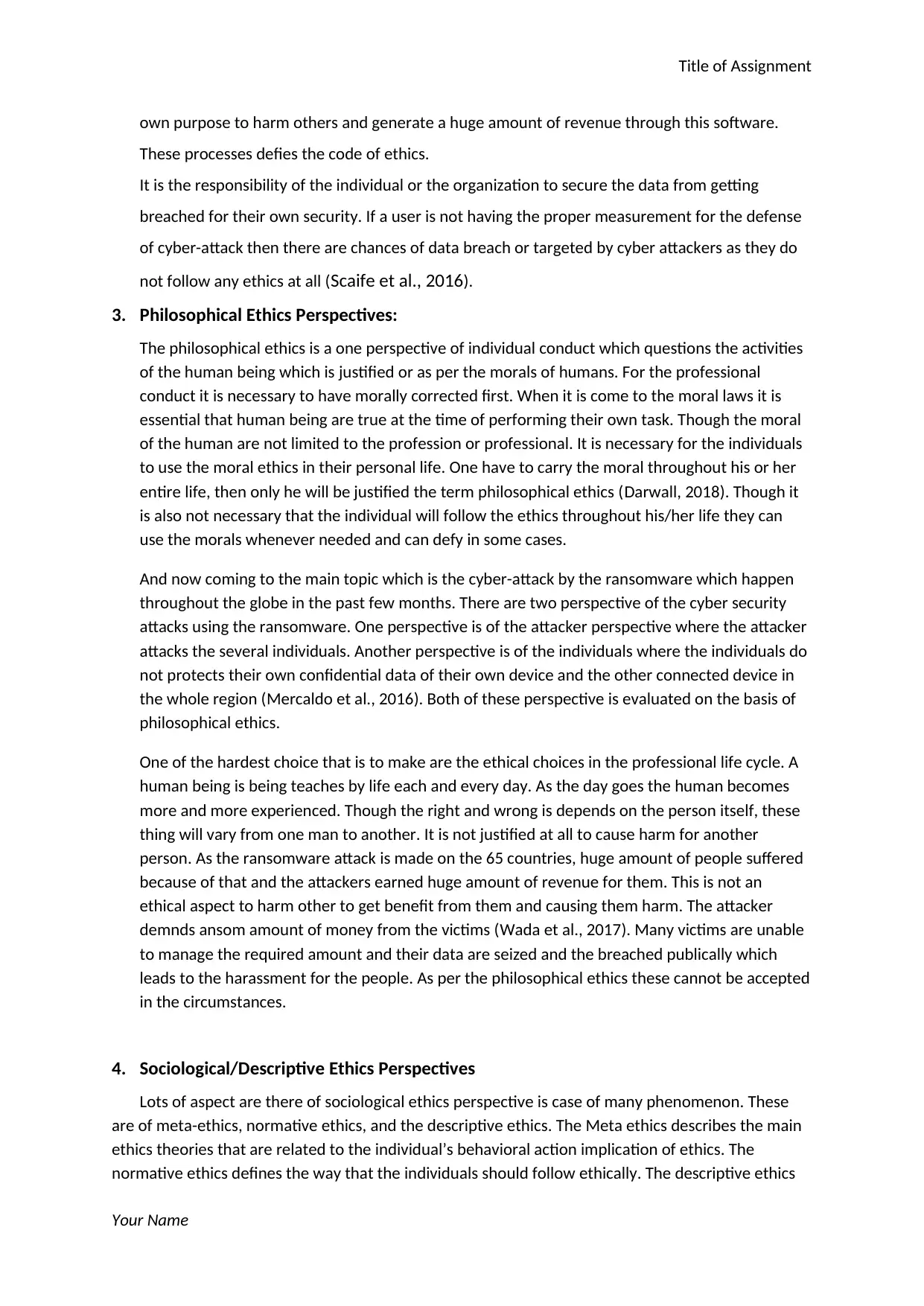
Title of Assignment
own purpose to harm others and generate a huge amount of revenue through this software.
These processes defies the code of ethics.
It is the responsibility of the individual or the organization to secure the data from getting
breached for their own security. If a user is not having the proper measurement for the defense
of cyber-attack then there are chances of data breach or targeted by cyber attackers as they do
not follow any ethics at all (Scaife et al., 2016).
3. Philosophical Ethics Perspectives:
The philosophical ethics is a one perspective of individual conduct which questions the activities
of the human being which is justified or as per the morals of humans. For the professional
conduct it is necessary to have morally corrected first. When it is come to the moral laws it is
essential that human being are true at the time of performing their own task. Though the moral
of the human are not limited to the profession or professional. It is necessary for the individuals
to use the moral ethics in their personal life. One have to carry the moral throughout his or her
entire life, then only he will be justified the term philosophical ethics (Darwall, 2018). Though it
is also not necessary that the individual will follow the ethics throughout his/her life they can
use the morals whenever needed and can defy in some cases.
And now coming to the main topic which is the cyber-attack by the ransomware which happen
throughout the globe in the past few months. There are two perspective of the cyber security
attacks using the ransomware. One perspective is of the attacker perspective where the attacker
attacks the several individuals. Another perspective is of the individuals where the individuals do
not protects their own confidential data of their own device and the other connected device in
the whole region (Mercaldo et al., 2016). Both of these perspective is evaluated on the basis of
philosophical ethics.
One of the hardest choice that is to make are the ethical choices in the professional life cycle. A
human being is being teaches by life each and every day. As the day goes the human becomes
more and more experienced. Though the right and wrong is depends on the person itself, these
thing will vary from one man to another. It is not justified at all to cause harm for another
person. As the ransomware attack is made on the 65 countries, huge amount of people suffered
because of that and the attackers earned huge amount of revenue for them. This is not an
ethical aspect to harm other to get benefit from them and causing them harm. The attacker
demnds ansom amount of money from the victims (Wada et al., 2017). Many victims are unable
to manage the required amount and their data are seized and the breached publically which
leads to the harassment for the people. As per the philosophical ethics these cannot be accepted
in the circumstances.
4. Sociological/Descriptive Ethics Perspectives
Lots of aspect are there of sociological ethics perspective is case of many phenomenon. These
are of meta-ethics, normative ethics, and the descriptive ethics. The Meta ethics describes the main
ethics theories that are related to the individual’s behavioral action implication of ethics. The
normative ethics defines the way that the individuals should follow ethically. The descriptive ethics
Your Name
own purpose to harm others and generate a huge amount of revenue through this software.
These processes defies the code of ethics.
It is the responsibility of the individual or the organization to secure the data from getting
breached for their own security. If a user is not having the proper measurement for the defense
of cyber-attack then there are chances of data breach or targeted by cyber attackers as they do
not follow any ethics at all (Scaife et al., 2016).
3. Philosophical Ethics Perspectives:
The philosophical ethics is a one perspective of individual conduct which questions the activities
of the human being which is justified or as per the morals of humans. For the professional
conduct it is necessary to have morally corrected first. When it is come to the moral laws it is
essential that human being are true at the time of performing their own task. Though the moral
of the human are not limited to the profession or professional. It is necessary for the individuals
to use the moral ethics in their personal life. One have to carry the moral throughout his or her
entire life, then only he will be justified the term philosophical ethics (Darwall, 2018). Though it
is also not necessary that the individual will follow the ethics throughout his/her life they can
use the morals whenever needed and can defy in some cases.
And now coming to the main topic which is the cyber-attack by the ransomware which happen
throughout the globe in the past few months. There are two perspective of the cyber security
attacks using the ransomware. One perspective is of the attacker perspective where the attacker
attacks the several individuals. Another perspective is of the individuals where the individuals do
not protects their own confidential data of their own device and the other connected device in
the whole region (Mercaldo et al., 2016). Both of these perspective is evaluated on the basis of
philosophical ethics.
One of the hardest choice that is to make are the ethical choices in the professional life cycle. A
human being is being teaches by life each and every day. As the day goes the human becomes
more and more experienced. Though the right and wrong is depends on the person itself, these
thing will vary from one man to another. It is not justified at all to cause harm for another
person. As the ransomware attack is made on the 65 countries, huge amount of people suffered
because of that and the attackers earned huge amount of revenue for them. This is not an
ethical aspect to harm other to get benefit from them and causing them harm. The attacker
demnds ansom amount of money from the victims (Wada et al., 2017). Many victims are unable
to manage the required amount and their data are seized and the breached publically which
leads to the harassment for the people. As per the philosophical ethics these cannot be accepted
in the circumstances.
4. Sociological/Descriptive Ethics Perspectives
Lots of aspect are there of sociological ethics perspective is case of many phenomenon. These
are of meta-ethics, normative ethics, and the descriptive ethics. The Meta ethics describes the main
ethics theories that are related to the individual’s behavioral action implication of ethics. The
normative ethics defines the way that the individuals should follow ethically. The descriptive ethics
Your Name
⊘ This is a preview!⊘
Do you want full access?
Subscribe today to unlock all pages.

Trusted by 1+ million students worldwide
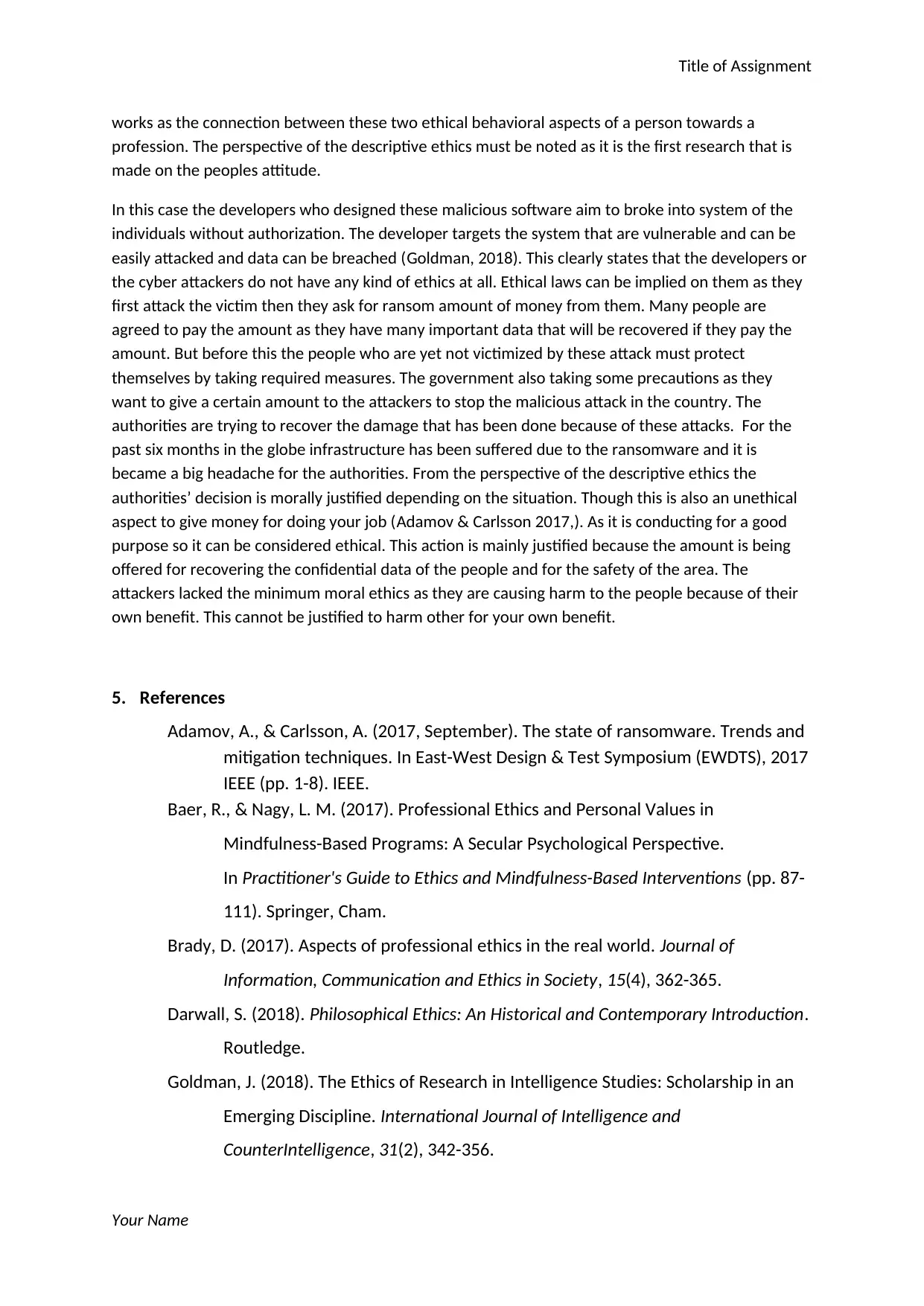
Title of Assignment
works as the connection between these two ethical behavioral aspects of a person towards a
profession. The perspective of the descriptive ethics must be noted as it is the first research that is
made on the peoples attitude.
In this case the developers who designed these malicious software aim to broke into system of the
individuals without authorization. The developer targets the system that are vulnerable and can be
easily attacked and data can be breached (Goldman, 2018). This clearly states that the developers or
the cyber attackers do not have any kind of ethics at all. Ethical laws can be implied on them as they
first attack the victim then they ask for ransom amount of money from them. Many people are
agreed to pay the amount as they have many important data that will be recovered if they pay the
amount. But before this the people who are yet not victimized by these attack must protect
themselves by taking required measures. The government also taking some precautions as they
want to give a certain amount to the attackers to stop the malicious attack in the country. The
authorities are trying to recover the damage that has been done because of these attacks. For the
past six months in the globe infrastructure has been suffered due to the ransomware and it is
became a big headache for the authorities. From the perspective of the descriptive ethics the
authorities’ decision is morally justified depending on the situation. Though this is also an unethical
aspect to give money for doing your job (Adamov & Carlsson 2017,). As it is conducting for a good
purpose so it can be considered ethical. This action is mainly justified because the amount is being
offered for recovering the confidential data of the people and for the safety of the area. The
attackers lacked the minimum moral ethics as they are causing harm to the people because of their
own benefit. This cannot be justified to harm other for your own benefit.
5. References
Adamov, A., & Carlsson, A. (2017, September). The state of ransomware. Trends and
mitigation techniques. In East-West Design & Test Symposium (EWDTS), 2017
IEEE (pp. 1-8). IEEE.
Baer, R., & Nagy, L. M. (2017). Professional Ethics and Personal Values in
Mindfulness-Based Programs: A Secular Psychological Perspective.
In Practitioner's Guide to Ethics and Mindfulness-Based Interventions (pp. 87-
111). Springer, Cham.
Brady, D. (2017). Aspects of professional ethics in the real world. Journal of
Information, Communication and Ethics in Society, 15(4), 362-365.
Darwall, S. (2018). Philosophical Ethics: An Historical and Contemporary Introduction.
Routledge.
Goldman, J. (2018). The Ethics of Research in Intelligence Studies: Scholarship in an
Emerging Discipline. International Journal of Intelligence and
CounterIntelligence, 31(2), 342-356.
Your Name
works as the connection between these two ethical behavioral aspects of a person towards a
profession. The perspective of the descriptive ethics must be noted as it is the first research that is
made on the peoples attitude.
In this case the developers who designed these malicious software aim to broke into system of the
individuals without authorization. The developer targets the system that are vulnerable and can be
easily attacked and data can be breached (Goldman, 2018). This clearly states that the developers or
the cyber attackers do not have any kind of ethics at all. Ethical laws can be implied on them as they
first attack the victim then they ask for ransom amount of money from them. Many people are
agreed to pay the amount as they have many important data that will be recovered if they pay the
amount. But before this the people who are yet not victimized by these attack must protect
themselves by taking required measures. The government also taking some precautions as they
want to give a certain amount to the attackers to stop the malicious attack in the country. The
authorities are trying to recover the damage that has been done because of these attacks. For the
past six months in the globe infrastructure has been suffered due to the ransomware and it is
became a big headache for the authorities. From the perspective of the descriptive ethics the
authorities’ decision is morally justified depending on the situation. Though this is also an unethical
aspect to give money for doing your job (Adamov & Carlsson 2017,). As it is conducting for a good
purpose so it can be considered ethical. This action is mainly justified because the amount is being
offered for recovering the confidential data of the people and for the safety of the area. The
attackers lacked the minimum moral ethics as they are causing harm to the people because of their
own benefit. This cannot be justified to harm other for your own benefit.
5. References
Adamov, A., & Carlsson, A. (2017, September). The state of ransomware. Trends and
mitigation techniques. In East-West Design & Test Symposium (EWDTS), 2017
IEEE (pp. 1-8). IEEE.
Baer, R., & Nagy, L. M. (2017). Professional Ethics and Personal Values in
Mindfulness-Based Programs: A Secular Psychological Perspective.
In Practitioner's Guide to Ethics and Mindfulness-Based Interventions (pp. 87-
111). Springer, Cham.
Brady, D. (2017). Aspects of professional ethics in the real world. Journal of
Information, Communication and Ethics in Society, 15(4), 362-365.
Darwall, S. (2018). Philosophical Ethics: An Historical and Contemporary Introduction.
Routledge.
Goldman, J. (2018). The Ethics of Research in Intelligence Studies: Scholarship in an
Emerging Discipline. International Journal of Intelligence and
CounterIntelligence, 31(2), 342-356.
Your Name
Paraphrase This Document
Need a fresh take? Get an instant paraphrase of this document with our AI Paraphraser
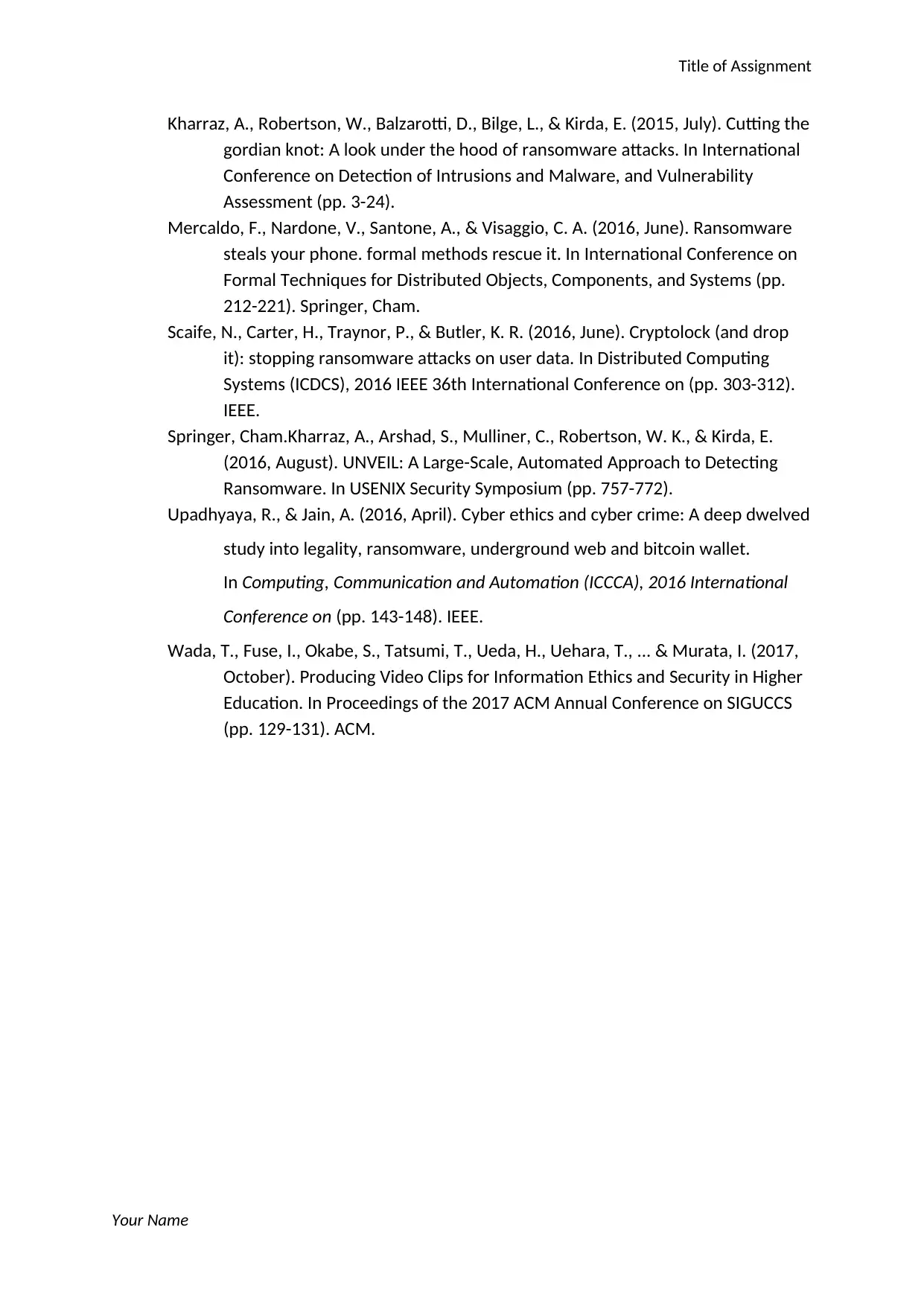
Title of Assignment
Kharraz, A., Robertson, W., Balzarotti, D., Bilge, L., & Kirda, E. (2015, July). Cutting the
gordian knot: A look under the hood of ransomware attacks. In International
Conference on Detection of Intrusions and Malware, and Vulnerability
Assessment (pp. 3-24).
Mercaldo, F., Nardone, V., Santone, A., & Visaggio, C. A. (2016, June). Ransomware
steals your phone. formal methods rescue it. In International Conference on
Formal Techniques for Distributed Objects, Components, and Systems (pp.
212-221). Springer, Cham.
Scaife, N., Carter, H., Traynor, P., & Butler, K. R. (2016, June). Cryptolock (and drop
it): stopping ransomware attacks on user data. In Distributed Computing
Systems (ICDCS), 2016 IEEE 36th International Conference on (pp. 303-312).
IEEE.
Springer, Cham.Kharraz, A., Arshad, S., Mulliner, C., Robertson, W. K., & Kirda, E.
(2016, August). UNVEIL: A Large-Scale, Automated Approach to Detecting
Ransomware. In USENIX Security Symposium (pp. 757-772).
Upadhyaya, R., & Jain, A. (2016, April). Cyber ethics and cyber crime: A deep dwelved
study into legality, ransomware, underground web and bitcoin wallet.
In Computing, Communication and Automation (ICCCA), 2016 International
Conference on (pp. 143-148). IEEE.
Wada, T., Fuse, I., Okabe, S., Tatsumi, T., Ueda, H., Uehara, T., ... & Murata, I. (2017,
October). Producing Video Clips for Information Ethics and Security in Higher
Education. In Proceedings of the 2017 ACM Annual Conference on SIGUCCS
(pp. 129-131). ACM.
Your Name
Kharraz, A., Robertson, W., Balzarotti, D., Bilge, L., & Kirda, E. (2015, July). Cutting the
gordian knot: A look under the hood of ransomware attacks. In International
Conference on Detection of Intrusions and Malware, and Vulnerability
Assessment (pp. 3-24).
Mercaldo, F., Nardone, V., Santone, A., & Visaggio, C. A. (2016, June). Ransomware
steals your phone. formal methods rescue it. In International Conference on
Formal Techniques for Distributed Objects, Components, and Systems (pp.
212-221). Springer, Cham.
Scaife, N., Carter, H., Traynor, P., & Butler, K. R. (2016, June). Cryptolock (and drop
it): stopping ransomware attacks on user data. In Distributed Computing
Systems (ICDCS), 2016 IEEE 36th International Conference on (pp. 303-312).
IEEE.
Springer, Cham.Kharraz, A., Arshad, S., Mulliner, C., Robertson, W. K., & Kirda, E.
(2016, August). UNVEIL: A Large-Scale, Automated Approach to Detecting
Ransomware. In USENIX Security Symposium (pp. 757-772).
Upadhyaya, R., & Jain, A. (2016, April). Cyber ethics and cyber crime: A deep dwelved
study into legality, ransomware, underground web and bitcoin wallet.
In Computing, Communication and Automation (ICCCA), 2016 International
Conference on (pp. 143-148). IEEE.
Wada, T., Fuse, I., Okabe, S., Tatsumi, T., Ueda, H., Uehara, T., ... & Murata, I. (2017,
October). Producing Video Clips for Information Ethics and Security in Higher
Education. In Proceedings of the 2017 ACM Annual Conference on SIGUCCS
(pp. 129-131). ACM.
Your Name
1 out of 5
Related Documents
Your All-in-One AI-Powered Toolkit for Academic Success.
+13062052269
info@desklib.com
Available 24*7 on WhatsApp / Email
![[object Object]](/_next/static/media/star-bottom.7253800d.svg)
Unlock your academic potential
Copyright © 2020–2026 A2Z Services. All Rights Reserved. Developed and managed by ZUCOL.




